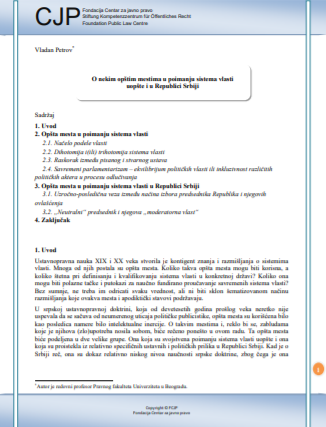O nekim opštim mestima u poimanju sistema vlasti uopšte i u Republici Srbiji
On Some Common Places in the Understanding of the System of Government in General and in the Republic of Serbia
Author(s): Vladan Petrov
Subject(s): Law, Constitution, Jurisprudence, Constitutional Law, Governance, Public Law, Government/Political systems
Published by: Fondacija Centar za javno pravo
Keywords: system of government; principle of the separation of powers; system of the Republic of Serbia; Serbian constitutional law; state unity;
Summary/Abstract: The author deals with some common places in the understanding of the system of government. He divides them in two groups: (1) those related to all the systems of government based on the principle of the separation of powers; (2) those specific to the system of the Republic of Serbia. He writes about: a) the need of theoretical rethinking and constitutional redefining the principle of separation of powers, which is not a classic trichotomy anymore; b) the relativism of doctrinal classification of systems of government (presidentialism – parliamentarism; presidentialism – parliamentarism – semi-presidentialism or mixed system), c) the gap between constitutional norm and constitutional reality and d) the evaluative transformation of modern parliamentarism from the ideal equilibrium of political powers to the inclusiveness of different political actors in the process of bringing political and legal decisions. The author criticizes the tendency in Serbian constitutional law science, started from 1990̕ s, which has blurred the difference between the law and the politics in understanding the institutions and mechanisms of the system of government. He accents that there is no causal connection between the direct election of the President of Republic and his omnipotence. On the other hand, the constitutional competences of the Serbian President are not so weak as some authors say interpreting the constitutional phrase „the President of the Republic shall express state unity“. According to the author, the most controversial spot is the statement about the President of the Republic as a representative of the citizens who functions as a neutral power which arbitrates between the National Assembly and the Government. This statement, which prevails in constitutional law literature especially in Serbia, is rather false and should be abandoned. The President of the Republic must be politically active in a constitutional manner. The point is to find a constitutional balance between a politically active President, an operative Government and a representative Parliament, on the one hand, and to strengthen the constitutional culture, on the other hand.
Series: Fondacija Centar za javno pravo - Projekti
- Page Count: 12
- Publication Year: 2018
- Language: Serbian
- Content File-PDF
- Introduction

